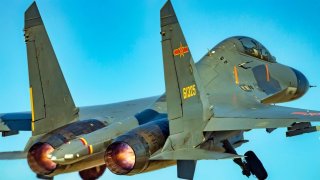J-11: China's Best Non-Stealth Fighter Jet Has a Russia Origin Story
The Shenyang J-11 is very obviously the Sukhoi Su-27. China was the first foreign recipient of the Soviet Union’s Su-27 – and the only foreign recipient before the fall off the Soviet Union.
Meet the J-11 Fighter: An important component of China’s rise is the development and production of modern military equipment. China, beginning to assert itself as a prospective hegemon in the Indo-China region, is building a military worthy of China’s ambition.
With over 1.4 billion citizens, the Chinese military is uniquely equipped with respect to human capitol. But human capital is only part of the equation; modern warfare demands modern weaponry. And thanks to an emphasis on fielding new weaponry, Chinese soldiers are increasingly well equipped. The timing is hardly a coincidence, with China asserting itself in multiple territorial disputes, and flaunting protocols in interactions with American military units.
Much has been made of China’s ongoing shipbuilding spree. And indeed, China is engulfed in one of human history’s most audacious shipbuilding sprees. But other elements of the Chinese military are receiving attention, too. Aviation, for example. Most notably, the development of the realized Chengdu J-20 stealth fighter and the projected Xi’an H-20 stealth bomber. The J-20 and the H-20 offer a glimpse into the future of the Chinese air force.
But the backbone of China’s contemporary air force is also worth considering – one aspect of which is the Shenyang J-11 twin-engine fighter jet, which marked significant progress in Chinese aerospace when first introduced years ago.
J-11: A familiar airframe
The Shenyang J-11 is very obviously the Sukhoi Su-27. China was the first foreign recipient of the Soviet Union’s Su-27 – and the only foreign recipient before the fall off the Soviet Union.
The Su-27 procurement, known within China as the ‘906 Project,’ hinted at China’s changing self-perception.
The conversation between China and the Soviet Union, about the purchase of a new fighter aircraft, began in 1988. Initially, the Soviets offered China the MiG-29, a capable fourth-generation air superiority fighter developed to counter American airframes like the F-15. But the Chinese were not impressed. The MiG-29 was hardly the Soviet’s most advanced fighter. And China wanted something more advanced, namely, the Su-27 – which at the time was the Soviet’s premier airframe.
Three Su-27s were sold to China before the Soviet Union fell. Then, the newly formed Russian government completed the Su-27 order (for 21 more airframes) and, more importantly, allowed China to produce their own Su-27 variant domestically. However, China and Russia would cancel the deal when Moscow accused Beijing of reverse engineering the plane.
The Chinese-built J-11 featured respectable specifications. With a one-man crew, the J-11 has two Shenyang WS-10A “Taihang” afterburning turbofan engines, capable of supplying 30,000 pounds of thrust each. The J-11 can handle 9gs, has a maximum speed of Mach 2.35, and a range of 2,190 miles. The J-11 can operate at altitudes up 62,000 feet and can climb at a rate of 59,000 feet per minute.
For armament, the J-11 carries one 30mm Gryazev-Shipunov GSh-30-1 cannon with 150 rounds. The J-11 also has ten hardpoints capable of carrying a variety of missiles, rockets, and bombs.
The J-11 in service
The J-11 first entered service decades ago. Today, China has 440 J-11’s, making the licensed aircraft a lynchpin of the PLAAF.
Fortunately, China’s involvement in international conflict has been limited, and the J-11 has not been used in the way an American or Russian equivalent would have been. The J-11 was involved in one well-publicized incident; however, it was indicative of growing tensions and shifting polarities.
In August of 2014, a J-11B intercepted a US Navy P-8 Poseidon over the South China Sea. Admiral John Kirby acknowledged the incident at a press conference, saying that the interception occurred 135 miles east of Hainan Island, significantly, in international airspace.
The intercepting J-11 “crossed under the aircraft with one pass having only 50-11 feet separation. The Chinese jet also passed the nose of the P-8 at 90 degrees with its belly toward the P-8 Poseidon, believed to be displaying its weapons load-out. Afterwards, the J-11 flew directly under and alongside the P-8, passing with 45 feet,” Kirby explained.
The maneuver was “unprofessional” and “unsafe” according to Kirby, and “not keeping with the kind of military-to-military relationship” that the US was hoping to maintain with China. The Pentagon, commenting on the incident, emphasized that “military activities may be conducted within the Exclusive Economic Zone of another nation as an exercise of the freedoms of navigation and overflight.”
China saw things differently.
“Totally groundless,” the Chinese Ministry of National Defense said of the US criticisms. According to China, the Chinese pilot maintained a safe distance and blamed the incident on the “massive and frequent close-in surveillance” that US airplanes were conducting in the region.
The incident has since become one of many close intercepts/diplomatic rows between the world’s most powerful nations. As tensions continue to increase in the Indo-Pacific, the J-11 may continue to play a relevant role on the world stage.
About the Author
Harrison Kass is a prolific national security writer and editor with over 1,000 published articles. An attorney, pilot, guitarist, and minor pro hockey player, Harrison joined the US Air Force as a Pilot Trainee but was medically discharged. Harrison holds a BA from Lake Forest College, a JD from the University of Oregon, and an MA from New York University. Harrison listens to Dokken.
All images are Creative Commons.


